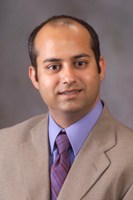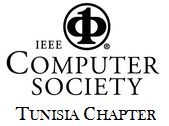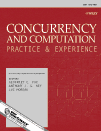- - Sandeep K. Shukla (Biography,
Abstract,
Home page)
Model Driven Embedded Software Generation:
A Generative Approach to Safety
- Michel Raynal (Biography,
Abstract,
Home page)
Abstractions pour la communication
et l'accord dans
les systèmes répartis sujets à défaillances
- Nicolas Guelfi (Biography, Abstract, Home page)
Dependability and Resilience from a Software
Engineering Perspective
Model Driven Embedded Software Generation: A Generative Approach to Safety
 Sandeep
K. Shukla
Sandeep
K. ShuklaAssociate Professor of Computer Engineering
Deputy Director of Center for Embedded Systems for Critical Applications
Director of FERMAT Lab
Virginia Polytechnic and State University, USA
Sandeep K. Shukla is an associate professor of computer engineering at
Virginia Tech. He is also a founder and deputy director of the center for
embedded systems for critical applications (CESCA), and director of his
research lab FERMAT. Sandeep was awarded the Presidential Early Career Award
for Science at Engineering (PECASE) award for his research in design
automation for embedded systems design, which in particular focuses on
system level design languages, formal methods, formal specification
languages, probabilistic modeling and model checking, dynamic power
management, application of stochastic models and model analysis tools for
defect-tolerant system design, and reliability measurement of
defect-tolerant systems. Sandeep has published more than 125 articles in
journals, books and conference proceedings. Sandeep co-authored three
research monographs, and four edited volumes. Sandeep has been elected as a
College of Engineering Faculty Fellow at Virginia Tech. In 2008 Sandeep was
awarded the Alexander Humboldt Foundation’s Bessel Award. Sandeep also
chaired a number of international conferences and workshops, edited a number
of special issues for various journals, and are on the editorial board of
IEEE Design & Test, IEEE Transactions on Computer, and IEEE Embedded Systems
Letters. Sandeep is a senior member of IEEE and ACM.
He is also an IEEE Computer Society Distinguished visitor, and an ACM distinguished speaker.
Abstract
Avionics, automotive, power plant control, and many
other safety-critical embedded systems require safe, predictable, and
statically analyzable software. Moreover, as the complexity of these
applications mounts, performance and safety both become increasingly
important. This increasing performance requirement drives the current market
trend of multi-core processors (single chip multiprocessors) in the desktop
market. However, recently embedded processors have started to surface with
multiple homogeneous or heterogeneous cores. Multi-threaded or concurrent
applications seem to be the best way to exploit these available parallel
processing resources.
Those with any experience with multi-threaded programming would admit that design and implementation of multi-threaded programs is extremely difficult and prone to subtle concurrency and synchronization bugs, even without the use of advanced techniques such as speculative hreading, or wait-free synchronization etc are. The inherent synchronization and dependency issues and the possible non-determinism are difficult to resolve without extremely skilled programmers, and possibly with the help of extensive static analysis. Static analysis and/or formal verification of large concurrent applications are again capacity limited by today’s state-of-the-art tools and techniques. Nevertheless, given the importance of safety in the target application domains, one has to produce absolutely correct code which is deterministic or predictable, and no non-deterministic execution behavior should lead to disastrous consequences.
Correct-by-construction multi-threaded program generation is therefore our methodology of choice. For this, we need a formal specification language with well defined semantics and proper characterizations as to when it is safe to generate guaranteed deterministic code. We have chosen Polychronous or multi-rate specification language borrowing from the French synchronous programming languages. Synchronous languages have so far proven useful for generating sequential (single-threaded) code for safety-critical applications. A particular characterization of polychronous specifications called the ‘endochrony’ is a sufficient condition for correct sequential code generation. Therefore, one could generate multiple sequential threads separately from ‘endochronous’ specification fragments, and compose them by generating the synchronization glue code. Unfortunately, ‘endochrony’ is not compositional, and therefore, the synchronization code generation becomes non-trivial. We show that a particular generalization of ‘endochrony’ called the ‘weak endochrony’ is sufficient for directly generating multi-threaded code from such specifications. Moreover, ‘weak endochrony’ is compositional and hence provides us with a modular code generation technique from polychronous specification.
In this talk, first, we elaborate on multi-rate specification formalism Polychrony. Then we explain the difficulties of deterministic and semantics preserving code generation from such specifications. Then we discuss endochrony, inadequacy of which leads to the weak endochrony concept, and how this provides a sufficient condition for safe multi-threaded code generation. Finally, we discuss future directions in our work on deterministic multi-threaded code generation for safety-critical applications.
Abstractions pour la communication et l'accord dans les systèmes répartis sujets à défaillances

Professor of Computer Science
IRISA, Campus de Beaulieu
Université de Rennes1
France
Michel Raynal est professeur d'informatique à l'IRISA-IFSIC (Université de Rennes, France). Les principes fondamentaux du calcul réparti constituent ses principaux centres d'intérêt. Michel Raynal est l'auteur d'un très grand nombres d'articles sur ses sujets.. et un des leaders mondiaux du calcul réparti. Plusieurs de ses articles ont été récompensés par un Best Paper Award''. Il a été membre du comité de programme de plus de 100 conférences internationales dans le domaine du calcul réparti et présidé le comité de programme des conférences majeures sur le sujet : IEEE Int'l Conference on Distributed Computing Systems (ICDCS), Symposium on Distributed Computing (DISC), Int'l Colloquium on Structural Information and Communication Complexity (SIROCCO), et Int'l Conference on Principles of Distributed Systems (OPODIS). Michel Raynal a été invité par de nombreuses universités de par le monde pour donner des cours sur le calcul réparti. Il est également l'auteur de huit livres sur le sujet, dont le dernier a pour titre "Communication and agreement abstractions for fault-tolerant asynchronous distributed systems".
Abstract
L'incertitude créée par les "adversaires" que sont l'asynchronisme et les défaillances rend difficile la compréhension, la conception et la maitrise du calcul réparti. Considérant de tels adversaires dans un contexte ou la communication entre entités se fait par passage de messages, l'exposé se concentrera sur les abstractions offertes aux applications, que son le registre partagé, la diffusion fiable uniforme et l'accord réparti. Ces abstractions fondamentales permettent de donner un sens précis aux mots "communiquer", "coopérer" et "être d'accord" lorsqu'on s'intéresse à un ensemble de processus. Elles permettent de concevoir des programmes distribués dont les propriétés peuvent être non seulement clairement énoncées mais aussi prouvées. Des résultats d'impossibilité qui doivent être connus sont associés à ces abstractions. L'exposé considèrera en conséquence des systèmes répartis enrichis avec des détecteurs de fautes adéquats.
Dependability and Resilience from a Software Engineering Perspective
 Nicolas
Guelfi
Nicolas
GuelfiProfessor of Computer Science
Faculty of Sciences, Technology and Communication
Computer Science & Communications Research Unit
LASSY - Laboratory for Advanced Software Systems
University of Luxembourg
Nicolas Guelfi is professor at the Faculty of Sciences, Technologies and Communications of the University of Luxembourg since March 1999, where he teaches, directs PhD students and makes research in collaboration with national and international partners. Currently, he is the head of the Laboratory for Advanced Software Systems. His main research and development activities concern the engineering and the evolution of reliable and secure distributed and mobile systems based on semi-formal methods and transformations. He is the author of around 50 publications in books, journals, conferences and workshops. He has been for three years the Luxembourgian ERCIM representative at
the executive committee of the ERCIM consortium and he is co-chairman of the ERCIM working groups on Software EngineeRing for rEsilieNt systems (SERENE - http://serene.uni.lu). SERENE considers resilient systems as open and distributed systems that can dynamically adapt in a predictable way to unexpected events. The research group of Nicolas
Guelfi is made of PhD students, engineers and post-doctoral members that are running national or international research projects with important cooperation with universities or industries.
Abstract
The first part of this talk aims at presenting a
rigorous conceptual framework for defining the concepts of dependability and
resilience. The terms dependability resilience, since the seventies, has
been used in nearly all the computer information systems and computer
science fields. The introduction and use of these concepts in all these
fields makes difficult to have a shared and precise definition of the
concept of resilience. Having such definition is nevertheless mandatory for
the software and systems engineering research community that create
development processes, languages and tools to support the engineering of
software and systems that would be required to be dependable or resilient.
For this, we introduce an abstract and generic terminology to be used when
speaking about resiliency. We also provide some abstract semantic
descriptions to these terminological elements. This formal framework is
defined from a software engineering perspective, which means that we define
its components such that they are useful for the development or improvement
of analysis, architectural design, detailed design, implementation,
verification and maintenance phases. The second part of the talk aims at
presenting an approach for modeling dependable collaborative
time-constrained business processes.
The effectiveness of the information system a particular organisation uses for running its business depends largely of the success in modelling such business. This is due to the fact the business model defines the requirements of the information system that will support the running of the business. Nowadays, there exist many business process development methods that are supported by modelling notations and tools. Unfortunately these methods are not capable to model jointly complex collaborations, time constraints and to offer means to support resilient business process engineering. We will present shortly a business process language called DT4BP, which has been designed to drive the modeling of dependable, collaborative and time-constrained business processes. The presentation of DT4BP is made targeting end users, which are business processes modellers.
NOTERE 2010
- Accueil
- Appel à communication
- Dates Importantes
- Soumission finale
- Comités
- Programme
- Conférenciers invités
- Inscription
Liens interéssants
NuméroS SpéciaUX
Springer Journal of Supercomputing
Wiley Concurrency and Computation: Practice and Experiment Journal
Sponsors









